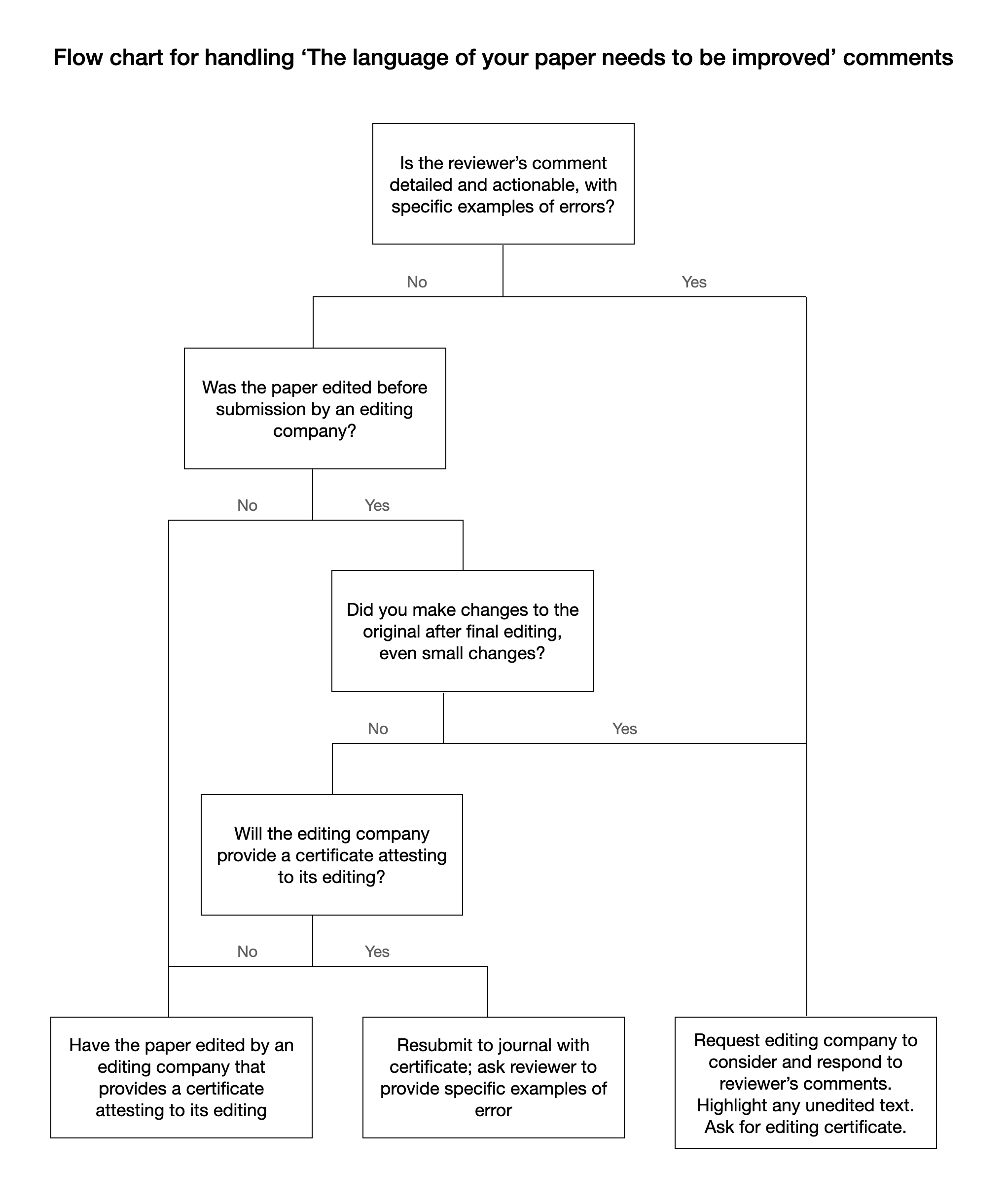How to handle ‘The language needs to be improved' reviewer comments
July 29th, 2022, by Guy Harris
One of the most common comments reviewers make about papers from Japanese authors is ‘The language needs to be improved.’
Before submitting a new paper, most authors have their paper checked by an editing service. So when authors receive this comment, they are made to wonder if the service did a good job. And when authors then ask the editing service to check their revised paper, and mention: ‘The reviewer commented that the language needs to be improved - can you please check again,’ the editing service - with its reputation under question - must then spend time reviewing text that they had already checked before submission.
At Dmed, we experience this problem with around one-third of the revised papers we work on. Sometimes, the comment is made by a non-native reviewer whose own English is so poor that they are clearly unable to make such a judgement. When we review again - which we cannot charge for - we seldom find errors. When we do, it is usually because the author has added extra text after our final check of their original paper, but before submission (in other words, the submission included new text which had not been edited). We are sometimes asked to check papers that were originally checked by another company, and it soon becomes clear that these previous editors were not native speakers.
The problem has been happening for decades. In the 1980s our colleague, the late Prof Patrick Barron, head of the Department of International Medical Communication at Tokyo Medical University, once spent hours editing a landmark paper by an internationally recognised Japanese clinician for a high-impact journal. The journal returned the paper, noting problems with the English. Puzzled and confounded, Prof Barron rechecked the paper word for word, and found no problems. Trusting Prof Barron, the author returned the paper with the response that no problems had been found and thus no changes were made. The journal made no followup comment and published the paper exactly as submitted.
Then and now, Japanese authors have often questioned whether requests to improve the language of their papers are made with reason and in good faith. Or whether the request was simply because the author was Japanese, and the reviewer had nothing else to say.
The bottom line is that one poorly considered comment from a reviewer can make authors lose confidence in their paper, slow publication, and waste professional time.
So today, I thought it would be good to discuss some of the issues that now surround this problem, and suggest a flowchart to help authors respond to it.
Most large publishing houses - Elsevier, Springer Nature, Wiley, Wolters Kluwer and so on - now offer manuscript editing services to authors. These became prominent around 2005, when the Open Access movement began to threaten the traditionally strong profits of the publishers. As one way to make up the revenue they were losing to Open Access, the publishers introduced a new service area, Author Services. These included manuscript editing. As the publishers lacked sufficient manuscript editing resources inhouse, they outsourced this work to the large editing companies on a profit-sharing basis. For example, Wolters Kluwer has partnered with Editage. Wolters Kluwer openly acknowledges its business relationship with Editage, but most of the other major publishers do not; instead, they use a ‘white-label’ arrangement. All publishers profit from them: the manuscript you submit for editing by a journal’s publishing company is passed on to the white label editing company, and the two parties split the profit.
Prior to this outsourcing, if a journal recommended that your paper required editing, it was doing so without conflict of interest. Now, however, journals which recommend editing and offer their own publishing company’s editing service, definitely do have a conflict of interest. And considering how rigorously most journals require that authors report conflicts, it might be reasonable to expect that journals should express theirs also.
Given these problems, authors who receive such a reviewer comment for a paper that was edited by a competent editing service - and had made no further changes to the edited text prior to submission - might consider that a more nuanced response is required. In our experience, comments on language can be categorized in two groups:
1. Fuzzy and vague comments with no substantial explanation or examples of error.
Here’s an example we recently received for a paper in its second round of review:

‘The grammar has to be revised and improved’ is not actionable or specific. No examples are provided. It lacks the rigor expected from peer reviewer, and instead appears as a ‘throw-away’ comment. But as is typical, the journal’s cover letter offered manuscript editing services.
2. Detailed and actionable comments, with specific examples of error.
These comments typically list a series of errors or awkward expressions that the reviewer considers unsuitable.So how should authors respond? Below we provide a flow chart to help authors handle these comments. Note our three suggested outcomes:
- Resubmit to the journal with a certificate from the editing company attesting to its editing, and ask the reviewer to provide specific examples of error;
- Request the editing company to consider and respond to reviewer’s comments - including correcting any errors it finds - and ask for a certificate attesting to its review; or
- Have the paper edited by a company that provides certificates attesting to its editing and that the language of the paper is suitable for publication.
Finally, we acknowledge that authors are in a difficult situation in handling this comment. They wish their paper to be accepted as quickly as possible, and do not wish to damage their relationship with the journal or appear uncooperative. So even if they disagree with the reviewer, they may simply choose to acquiesce. But for authors who experience difficulties with this or any other aspect of the submission process, Dmed is always ready to support you. We have a long and successful history of author support.

